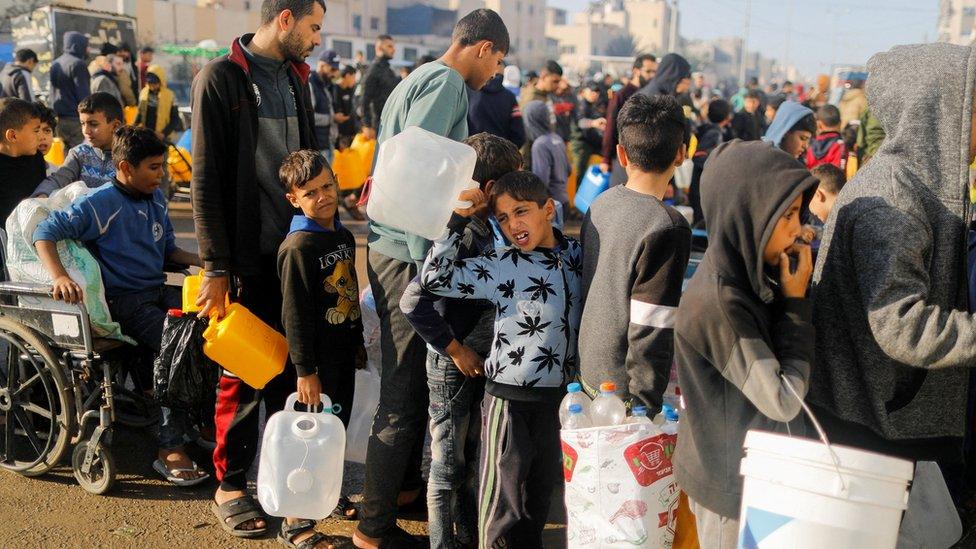Israel's PM Netanyahu lays out Gaza plan for after the war
- Published

Under Mr Netanyahu's plan, Palestinians with no links to armed groups would run Gaza
Israeli Prime Minister Benjamin Netanyahu has laid out his vision for a post-war Gaza.
Under his plan Israel would control security indefinitely, and Palestinians with no links to groups hostile to Israel would run the territory.
The US, Israel's major ally, wants the West Bank-based Palestinian Authority (PA) to govern Gaza after the war.
But the short document - which Mr Netanyahu presented to ministers last night - makes no mention of the PA.
He has previously ruled out a post-war role for the internationally backed body.
He envisages a "demilitarised" Gaza; Israel would be responsible for removing all military capability beyond that necessary for public order.
There would be a "Southern Closure" on the territory's border with Egypt to prevent smuggling both under- and overground.
And "de-radicalisation" programmes would be promoted in all religious, educational and welfare institutions. The document suggests Arab countries with experience of such programmes would be involved, though Mr Netanyahu has not specified which.
Under the plan Israel would also maintain security control over the entire area west of Jordan from land, sea and air.
Mr Netanyahu has been under pressure - at home and internationally - to publish proposals for Gaza since he began his military operation. He is keen to restore a crumbling reputation as a leader who can keep Israel safe and will want to appeal to right wing hardliners in his coalition government.
A spokesman for Mahmoud Abbas, the president of the PA, said Mr Netanyahu's plan was doomed to fail.
Nabil Abu Rudeineh said: "If the world is genuinely interested in having security and stability in the region, it must end Israel's occupation of Palestinian land and recognise an independent Palestinian state."
Mr Netanyahu repeated his rejection of any unilateral recognition by Western countries of a Palestinian state.
On Friday US Secretary of State Antony Blinken said the US was opposed to any reoccupation of Gaza by Israel as well as any reduction in the size of the territory.
"Gaza... cannot be a platform for terrorism. There should be no Israeli reoccupation of Gaza. The size of Gaza territory should not be reduced," he said at a G20 ministers meeting in Argentina.
Meanwhile negotiators trying to broker a temporary ceasefire and the release of Israeli hostages are expected to meet in Paris.
The US wants a deal in place before the Muslim holy month of Ramadan begins in just over a fortnight.
And, as the humanitarian situation worsens in Gaza, there is international pressure too for the war to end. The Hamas-run Ministry of Health reports that more than 29,500 people, mostly women and children, have been killed since the war began in October.
Israel's military offensive was triggered by Hamas's unprecedented attack on 7 October in which gunmen killed about 1,200 people - mainly civilians - and took 253 back to Gaza as hostages.
Overnight the head of the UN body responsible for Palestinian refugees (Unrwa) warned that Gaza faces a "monumental disaster with grave implications for regional peace, security and human rights".
In a letter to the president of the UN general assembly, Philippe Lazzarini said the agency "has reached breaking point, with Israel's repeated calls to dismantle Unrwa and the freezing of funding by donors at a time of unprecedented humanitarian needs in Gaza".
Some of Unrwa's biggest donors suspended funding for the agency last month after Unrwa sacked several of its staff amid allegations by Israel that they had participated in the October attacks.
Mr Netanyahu aims to close the agency as part of his post-war plan and replace it with - as yet unspecified - international aid organisations.
And he has insisted that he will continue his war until Israel has dismantled Hamas and Islamic Jihad - the second largest armed group in Gaza - and all Israeli hostages are returned.
At the end of 2023, Mr Netanyahu warned the war could go on for "many more months".
Meanwhile the US has described Israel's expansion of settlements in the occupied West Bank as inconsistent with international law.
"Our administration maintains a firm opposition to settlement expansion, and in our judgment this only weakens, doesn't strengthen Israel's security," Mr Blinken said.
It overturns a move made in 2019 by the Trump administration, which was welcomed by Israel, when then Secretary of State Mike Pompeo announced that Washington no longer viewed settlements as breaching international law.
Related topics
- Published6 January 2024
